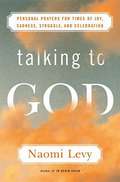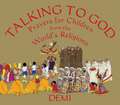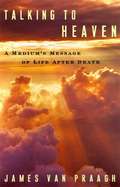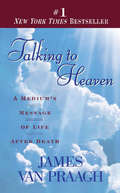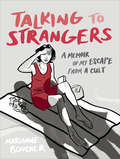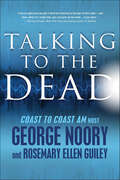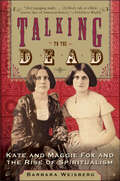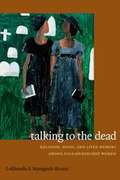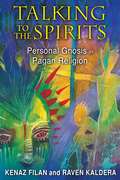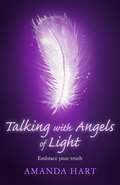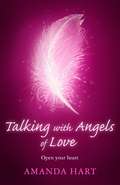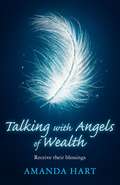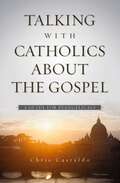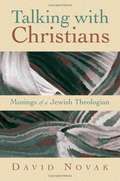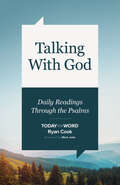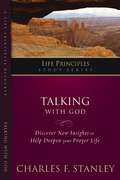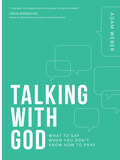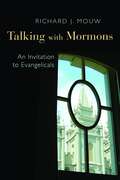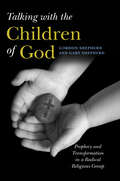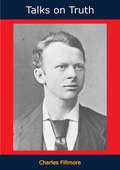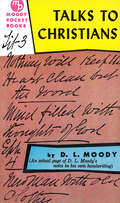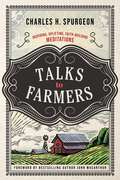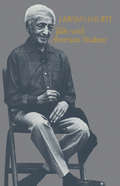- Table View
- List View
Talking to God
by Naomi LevyAfter the publication of her best-selling bookTo Begin Again,Naomi Levy received a flood of feedback from readers telling her how much the prayers in it had helped and moved them. Many urged her to publish a collection of her prayers—and now she has. In a time when we all need inspiration, comfort, and connection,Talking to Godwill help us reclaim prayer as an integral part of our lives, making it as natural and uninhibited as talking to our loved ones. Prayer is essential to the lives of millions, but many of us are searching for ways to supplement traditional prayers with ones that are less formal and more intimate. Written in a simple and direct style, the prayers in this book—and the wonderful stories that accompany them—are for people of all faiths, and for all occasions large and small. Naomi Levy’s personal prayers address the anxieties and roadblocks we all face in contemporary life. There are prayers for facing a new day, realizing one’s potential at work, celebrating an anniversary or birthday, and going to sleep at night. And there are prayers for the more profound occurrences in life—love and marriage, pregnancy and childbirth, illness, loss, and death. Rabbi Levy’s words, imbued with grace and empathy, touch on the entire range of human experience. Many of us will recognize ourselves in her prayers and stories and will be comforted by them, as well as challenged and uplifted. Perhaps most important, they are stepping-stones for us to go on and create our own prayers, to find meaning in our own lives, and to begin or renew our own relationships with God. From the Hardcover edition.
Talking to God: Prayers for Children from the World's Religions
by DemiIn this beautifully illustrated book of short prayers from major world religions, award-winning author Demi shows children the great value of talking to God. Here they will find many time-honored favorites, including prayers of praise, prayers of petition, prayers of gratitude, and prayers of blessing. Taking readers on a fascinating journey across the globe, Demi&’s stunning illustrations celebrate the life of prayer shared by all the world&’s religions. Moving from King Solomon&’s Temple and the Dome of the Rock in Jerusalem to St. Mark&’s Cathedral in Venice to the Delhi Mosque and the River Ganges in India; from North America to Central Africa to China and Japan—each exciting new illustration transports readers to a holy destination where they can experience the religion&’s life of prayer directly at its source. Religions featured are Judaism, Christianity, Islam, Hinduism, Buddhism, Taoism, Shintoism, American Plains Indian, and Central African. Also included are an author&’s preface and an informative appendix with helpful notes on the prayers and illustrations.
Talking to Heaven
by James Van PraaghIn this bestselling book, author James Van Praagh shares many personal and deeply moving stories of after death communication. He then gives examples of how one can learn to meditate and improve one's psychic abilities.
Talking to Heaven: A Medium's Message of Life After Death
by James Van PraaghDoreen Virtue and James Van Praagh have drawn upon their combined years of spiritual counseling work to bring you a healing tool to create clear conversations with heaven. Your loved ones in heaven want to talk with you, and share their love and reassurance to help heal your grief. With these Talking to Heaven Mediumship Cards, you can ask a departed friend or family member a question and receive answers through the 44 beautiful cards in the deck and the messages in the accompanying guidebook. Designed to complement Doreen and James's How to Heal a Grieving Heart, this card deck is a powerful reassurance of the reality of heaven.
Talking to Strangers: A Memoir of My Escape from a Cult
by Marianne BoucherFor fans of Wild Wild Country, Scientology and the Aftermath and Uncover: Escaping NXIVM, a spellbinding graphic memoir about a teenage girl who was lured into a cult and later fought to escape and reclaim her identity.Welcome to a place where you are valued. Where everyone is kind. Where you can be your truest self. It was the summer of 1980, and Marianne Boucher was ready to chase her figure skating dream. Fuelled by the desire to rise above her mundane high-school life, she sought a new adventure as a glamorous performer in L.A.And then a chance encounter on a California beach introduced her to a new group of people. People who shared her distrust of the status quo. People who seemed to value authenticity and compassion above all else. And they liked her. Not Marianne the performer, but Marianne the person.Soon, she'd abandoned school, her skating and, most dramatically, her family to live with her new friends and help them fulfill their mission of "saving the world." She believed that no sacrifice was too great to be there--and to live with real purpose. They were helping people, and they cared about her . . . didn't they?Talking to Strangers is the true story of Marianne Boucher's experiences in a cult, where she was subjected to sophisticated brainwashing techniques that took away her freedom, and took over her mind. Told in mesmerizing graphic memoir form, with vivid text and art alike, Marianne shares how she fell in with devotees of a frightening spiritual abuser, and how she eventually, painfully, pulled herself out.
Talking to the Dead
by George Noory Rosemary Ellen GuileyThroughout history, people have sought ways to contact the dead and spirits. Such experiences challenge beliefs and often set people on a path of deeper exploration, looking for validation—and ways to have controlled, direct contact. Do spirit communication devices really work? What are the prospects of someday being able to pick up a cell phone or sit in front of a webcam and talk to the Other Side? While proof of contact is still elusive, there is an abundance of tantalizing evidence and experience to inspire people.For the past century, inventors have been inspired by the spirits themselves to create telephone, video, radio, and computers to attempt real-time, two-way communication with the dead and other entities.Talking to the Dead explores the colorful history and personalities behind spirit communications, weaving together spirituality, metaphysics, science, and technology. It examines the idea that new technology can connect to the ancient and universal wisdom of the "music of the spheres"; that contact with the spirit realms can be made through the vibrations of sound.At the Publisher's request, this title is being sold without Digital Rights Management Software (DRM) applied.
Talking to the Dead: Kate and Maggie Fox and the Rise of Spiritualism
by Barbara WeisbergBarbara Weisberg’s Talking to the Dead blends biography and social history in this revelatory story of the family responsible for the rise of Spiritualism.A fascinating story of spirits and conjurors, skeptics and converts in the second half of nineteenth century America viewed through the lives of Kate and Maggie Fox, the sisters whose purported communication with the dead gave rise to the Spiritualism movement—and whose recanting forty years later is still shrouded in mystery.In March of 1848, Kate and Maggie Fox—sisters aged eleven and fourteen—anxiously reported to a neighbor that they had been hearing strange, unidentified sounds in their house. From a sequence of knocks and rattles translated by the young girls as a "voice from beyond," the Modern Spiritualism movement was born.Talking to the Dead follows the fascinating story of the two girls who were catapulted into an odd limelight after communicating with spirits that March night. Within a few years, tens of thousands of Americans were flocking to séances. An international movement followed. Yet thirty years after those first knocks, the sisters shocked the country by denying they had ever contacted spirits. Shortly after, the sisters once again changed their story and reaffirmed their belief in the spirit world. Weisberg traces not only the lives of the Fox sisters and their family (including their mysterious Svengali–like sister Leah) but also the social, religious, economic and political climates that provided the breeding ground for the movement. While this is a thorough, compelling overview of a potent time in US history, it is also an incredible ghost story.
Talking to the Dead: Religion, Music, and Lived Memory among Gullah/Geechee Women
by LeRhonda S. Manigault-BryantTalking to the Dead is an ethnography of seven Gullah/Geechee women from the South Carolina lowcountry. These women communicate with their ancestors through dreams, prayer, and visions and traditional crafts and customs, such as storytelling, basket making, and ecstatic singing in their churches. Like other Gullah/Geechee women of the South Carolina and Georgia coasts, these women, through their active communication with the deceased, make choices and receive guidance about how to live out their faith and engage with the living. LeRhonda S. Manigault-Bryant emphasizes that this communication affirms the women's spiritual faith--which seamlessly integrates Christian and folk traditions--and reinforces their position as powerful culture keepers within Gullah/Geechee society. By looking in depth at this long-standing spiritual practice, Manigault-Bryant highlights the subversive ingenuity that lowcountry inhabitants use to thrive spiritually and to maintain a sense of continuity with the past.
Talking to the Spirits: Personal Gnosis in Pagan Religion
by Raven Kaldera Kenaz FilanA guide to direct communication with the spirits and the Gods • Offers practices for seekers and groups to learn to hear and respond to the spirits and the Gods as well as what to do (and not do) if you receive a message • Explains how to authenticate spiritual messages with divination • Discusses how to avoid theological conflicts when someone’s personal gnosis differs from that of their Pagan group For our ancestors the whole world was alive with spirits. The Gods bubbled forth from rivers and springs and whispered in the breezes that rustled through cities and farms. The ground underfoot, the stones, the fire that cooked the food and drove off the darkness, these all had spirits--not just spirits in some other dimension, but spirits in them who could be spoken to and allied with. In today’s world we are led to believe that the spirits long ago went silent and that spiritual wisdom can only be gained through established religious doctrine. Providing a guide for opening two-way conversation with the spirits of daily life as well as direct communication with the Gods, Kenaz Filan and Raven Kaldera explore how to enrich your spiritual path with personal gnosis--asking your Guides for assistance or teachings and receiving a response. They explain how to develop your sensitivity to the voices of the Divine, discern genuine spiritual messages from the projection of internal psychodrama, and what to do (and not do) with the messages you receive. Confirming their own personal gnosis with Northern Tradition Pagan beliefs and Greco-Roman, Celtic, Egyptian, and indigenous hunter-gatherer lore, the authors discuss how to avoid theological conflicts when someone’s personal gnosis differs from that of their Pagan group as well as how to authenticate messages with individual and group divination. Offering practices and principles for seekers and groups, they reveal that the spirits never went silent, we simply forgot how to hear them.
Talking with Angels of Light: Embrace your Truth
by Amanda HartAmanda Hart was rescued by guardian angels as a child and from thence on they became a beacon of hope throughout her turbulent journey into womanhood. The illuminating conversations she has with her angels remain an important aspect of her everyday life, bringing her continual support and spiritual fulfilment. She now dedicates her life to helping others connect with their own angels, helping them to find deeper meaning and happiness in their lives.Talking with Angels of Light is a book for you if the values and beliefs that have guided your life so far are based on destructive relationships, negative emotions or traumatic experiences from your past. Amanda Hart will teach you how to open your heart and allow your angels to save you from darkness and bring you into the light where you belong.The book includes meditations to connect with your angels of light, space to record the blessings they send you and real accounts of angelic assistance granted to Amanda and her clients over the years. There are also practical exercises, Amanda calls 'Your Lightbulb Moments' that will make you more aware of the brilliance in the world around you. Soon you will emerge from the shadows of despair and shine like the purest light in the universe, glowing from the inside out.
Talking with Angels of Light: Embrace your Truth
by Amanda HartAmanda Hart was rescued by guardian angels as a child and from thence on they became a beacon of hope throughout her turbulent journey into womanhood. The illuminating conversations she has with her angels remain an important aspect of her everyday life, bringing her continual support and spiritual fulfilment. She now dedicates her life to helping others connect with their own angels, helping them to find deeper meaning and happiness in their lives.Talking with Angels of Light is a book for you if the values and beliefs that have guided your life so far are based on destructive relationships, negative emotions or traumatic experiences from your past. Amanda Hart will teach you how to open your heart and allow your angels to save you from darkness and bring you into the light where you belong.The book includes meditations to connect with your angels of light, space to record the blessings they send you and real accounts of angelic assistance granted to Amanda and her clients over the years. There are also practical exercises, Amanda calls 'Your Lightbulb Moments' that will make you more aware of the brilliance in the world around you. Soon you will emerge from the shadows of despair and shine like the purest light in the universe, glowing from the inside out.
Talking with Angels of Love: Open your Heart
by Amanda HartThere was once a time in Amanda Hart's life when she did not know how to be secure in her own worth, was a stranger to self-love and found herself constantly trapped in a cycle of toxic relationships, coercive control and an overwhelming sense of lonliness. Somehow she summoned enough faith to form an astonishing connection with her guardian angels, which became the only remedy for emotional trauma she experienced from early childhood into adulthood.Amanda's angels taught her that we are all worthy of an authentic, non-judgemental love. Now she devotes her life to helping others open their hearts and receive angelic assistance. Talking with Angels of Love will show you how to accept your circumstances, love the skin you are in and recognise the difference between healthy love and toxic love. Filled with practical exercises, meditations to channel your angels' love, pages to record their loving messages and touching real-life stories about the healing power of love, this book will soothe your soul and help you to trust the goodness in others again. Amanda believes that if you open your heart to the angels their love is everlasting, and you will never be lonely again.
Talking with Angels of Wealth: Receive their blessings
by Amanda HartAmanda Hart was rescued by guardian angels as a child and from thence on they became a beacon of hope throughout her turbulent journey into womanhood. The illuminating conversations she has with her angels remain an important aspect of her everyday life, bringing her continual support and spiritual fulfillment. She now dedicates her life to helping others connect with their own angels, helping them to find deeper meaning and happiness in their lives.From the author of Talking with Angels of Light comes another empowering and life-altering book. Amanda Hart's connection with her guardian angels has taught her how to unlock her power, purpose and voice when it comes to financial matters. By following practical exercises, meditations and reading real-life anecdotes this book will guide you towards a healthy, revitalised relationship with money.
Talking with Catholics about the Gospel: A Guide for Evangelicals
by Christopher A. CastaldoIn Talking with Catholics about Jesus, author Chris Castaldo provides an easy-to-follow introduction to basic Catholic belief and practice, equipping evangelical Protestants for more fruitful spiritual conversations. Written in accessible, non-technical language, this short book offers readers: A more informed awareness of Catholicism Encouragement to move from a combative posture to a gracious one Clarification of erroneous caricatures of Catholics in favor of a more constructive understanding Based in part on Castaldo's experience as a Catholic and time spent working professionally in the Catholic Church, Talking with Catholics about Jesus gives readers a framework for recognizing where lines of similarity and difference fall between Catholics and evangelical Protestants, along with handy tips for engaging in spiritual discussions. Readers will gain encouragement and practical insights for gracious and worthwhile discussions of faith with Catholic believers.
Talking with Christians: Musings of a Jewish Theologian
by David NovakBack Cover: In Talking with Christians, "David Novak's compelling reflections explore the central theological concerns of Judaism and Christianity and provide a unique Jewish perspective on Jewish-Christian dialogue. Novak ranges broadly over what matters most in interfaith discussion, including the nature of revelation and the methods of a true theological dialogue that does not slip into relativism. Alongside searching studies of such great Christian theologians as Thomas Aquinas, Karl Barth, and Paul Tillich, Novak offers empathetic treatments of contemporary issues, including the controversial canonization of Jewish convert Edith Stein and the moral crisis of the West after the Holocaust. His Talking with Christians is a significant sign of hope for all people of faith who recognize the need to learn from one another. "For those readers who disagree with some of the author's arguments and conclusions, his discussions allow people to crystallize their own thinking and gain insight into someone who thinks differently. Novak's musings might cause both those who disagree and agree to continue the author's discussions with others to bring about understanding of important issues in today's world.
Talking with God: Daily Readings Through the Psalms
by Today in the Word Ryan CookYou, Lord, hear the desire of the afflicted; you encourage them, and you listen to their cry. Psalm 10:17 How do we bring everything to God? Our fears and disappointments. Our despair and doubts. The heartaches and hurts. The Psalms is one of the most beloved books in the Bible—its beautiful, raw, and sometimes shockingly honest pleas show us how to communicate the depths of our soul to God. In Talking with God, you&’ll learn how to talk openly and honestly with God, how to express without fear and reservation the emotions that fill your heart—whether it&’s praise or despair, misery or triumph, vengeance or a cry for help. Today in the Word, a devotional ministry from Moody Bible Institute, will help you walk through the Psalms day by day and learn how to talk to God with your whole heart. Walking alongside you as you open God&’s Word, featured author Dr. Ryan Cook shares helpful background information on each psalm that will enrich your understanding. Learn to pray in a way that draws you into a rich relationship with God, finding hope and courage to face each day. The 150 daily readings, paired with questions for reflection and application, will fill your heart with the wisdom, beauty, and life found in the Psalms.
Talking with God: Talking With God Through Prayer (Life Principles Study Series)
by Charles StanleyTrue communication with God is more than talking to God, it's talking with God-through prayer. Prayer that involves speaking and listening. In Talking with God, Charles Stanley discusses the general principles that are basic to everyone's prayer life, explaining how your prayers can lead to a more intimate than a relationship with God and how you can encourage others in their own prayer lives. The Life Principles Study Guides are perfect companions to Dr. Stanley's Life Principles Bible or for use on their own. They are a unique approach to Bible study, incorporating biblical truth, personal insights, emotional responses, and a call to action. Whether you use a study in a group or as an individual, it will help you get in touch with the Bible, God, and yourself.
Talking with God: What To Say When You Don't Know How To Pray
by Adam WeberLife is crazy. Prayer is simple. Prayer seems like it should be so simple. Yet when it comes to actually praying, it often feels awkward and complicated. I mean, what should you actually pray about? What do you say? Is there anything you should or shouldn’t say? Do you have to speak out loud? Where do you even start? To make matters worse, we’ve heard about prayer for so long that we feel awkward asking about it. It’s like having to ask a person’s name after knowing them for years. We’re embarrassed to ask because we really should know their name by now. Then comes the reality and craziness of life. Between work, parenting, walking the dog, a full inbox, keeping up on social media—who has time to pray? The truth is, prayer is simple. It’s like talking; talking with a good friend. Here’s the best part: No matter where we are in life, God can’t wait to talk with us. What does it look like to pray in the midst of your life? What do you say when you don’t know how to pray? I’m asking the same questions. Let’s talk.
Talking with Mormons: An Invitation to Evangelicals
by Richard J. MouwFor over a decade Fuller Seminary president Richard Mouw has participated in Mormon-evangelical dialogue with a view to developing a better understanding between the two groups. His participation in these discussions has drawn severe criticism and even anger from people who believe such talks are pointless or even dangerous. This brief, highly accessible book is his answer. Advocating humility, patience, and a willingness to admit our own shortcomings, Mouw shows why it is necessary to move beyond stark denunciation to a dialogue that allows both parties to express differences and explore common ground. Without papering over significantly divergent perspectives on important issues like the role of prophecy, the nature of God, and the creeds, Mouw points to areas in which Mormon-evangelical dialogue evidences hope for the future. In so doing, he not only informs readers but also models respectful evangelical debate.
Talking with the Children of God: Prophecy and Transformation in a Radical Religious Group
by Gary Shepherd Gordon ShepherdGrounded in direct, systematic observation by neutral observers, Talking with the Children of God is a unique study of the radical religious movement now known as The Family International. The book draws on extraordinarily candid interviews with the group's leaders and administrative staff. In revealing new information about the organization's history, beliefs, and use of prophecy, Gordon Shepherd and Gary Shepherd offer a highly detailed case study that is both an antidote to sensationalized coverage of the group and a means for understanding the transformational practices of new religious movements in general. One of the most controversial groups emerging from the Jesus People movement of the 1960s, the Family originally was known as The Children of God. Under leader David Berg, members proclaimed an apocalyptic "Endtime," shunned secular occupations, lived communally, and adopted unusual sexual practices that led to abuse scandals in the 1970s and 1980s. Following Berg's death in 1994, the organization began to dramatically alter its evangelization efforts and decision-making processes. Talking with the Children of God builds a picture of a complex organization with ten thousand core members worldwide, including details on the lives, careers, and responsibilities of the second generation and their efforts to defend their faith. The authors summarize the Family's history and beliefs as well as its controversial past. In particular, they analyze the organization's use of prophecy--or channeled revelations from Jesus and other spiritual beings--for making decisions and setting policy, revealing how this essentially democratic process works and how it shapes Family life and culture. These remarkable insights are the result of sixteen years of surveys and field observations conducted in Family member homes in sixteen countries, plus four days of face-to-face interviews with Family leaders and organizational staff. The volume also includes condensed transcripts of the interviews with analysis by Shepherd and Shepherd.
Talks on Truth (Unity Classic Library #2)
by Charles FillmoreOriginally published in 1926, this book presents fourteen enlightening talks by Unity’s co-founder Charles Fillmore. It explores the metaphysical aspects of Christianity and the basic principles on which the Unity movement were founded. There is also a question chapter on all fourteen lessons at the end of the book.Lesson subjects are: Reform Your God Thought; Microorganisms; The I Am In Its Kingdom; How Shall The Dead Be Raised?; The Development Of Divine Love; The Ministry Of The Word; Ye Must Be Born Again; Obedience; The Church Of Christ; The Lord’s Body; The Restoration Of God’s Kingdom; The Holy Spirit; Attaining Eternal Life; and, Jesus Christ’s Atonement.
Talks to Christians
by Dwight L. MoodyHow does a person live a life that honors God? In this straightforward classic, D.L. Moody shares his thoughts on various topics such as prayer, assurance of salvation, confessing sin, and following Christ. Take time to be reminded of foundational truths of the Christian faith and be encouraged in the promises God makes to His people.
Talks to Christians
by Dwight L. MoodyHow does a person live a life that honors God? In this straightforward classic, D.L. Moody shares his thoughts on various topics such as prayer, assurance of salvation, confessing sin, and following Christ. Take time to be reminded of foundational truths of the Christian faith and be encouraged in the promises God makes to His people.
Talks to Farmers: Reflections on Spiritual Growth
by Charles H. SpurgeonWhat can God&’s creation teach us about ourselves, our communities, and modern Christianity? Talks to Farmers: Inspiring, Uplifting, Faith-Building Meditations, written by world renowned preacher Charles H. Spurgeon, uncovers the lessons we can learn from taking a closer look at nature. Includes Foreword by New York Times bestselling author, pastor, and Spurgeon admirer John MacArthur.First published in 1882, Talks to Farmers is a collection of nineteen of Spurgeon's best-known sermons. Within each chapter, Spurgeon artfully breaks down biblical parables, psalms, and passages through an agricultural lens to teach you timeless spiritual truths and deepen your relationship with Christ. Updated for today&’s reader, this new edition of Talks to Farmers is designed to cultivate your faith along the way.Talks to Farmers is a hopeful, encouraging read for every Christian. Convicting and enlightening, Spurgeon's style of dissecting a verse and beautifully weaving it back together for its true purpose--to point us to Christ, our everlasting source of hope and joy--truly shines in this modern edition of Talks to Farmers. Throughout Talks to Farmers, Spurgeon shares the essential life lessons he&’s learned about:The importance of developing a healthy prayer lifeHow implementing a practice of gratitude can change your perspective on the world foreverWhat God's creation can teach us about humanity, society, and modern ChristianityThe power of our day-to-day observations of natureThe incredible variety of ways in which faith journeys can unfoldHow God cares for us, just as he cares for every creature on earthNearly 140 years after these sermons were first delivered, Spurgeon's inspirational messages continue to prove practical and relevant for modern believers, drawing from salt-of-the-earth stories from the Bible that explore our relationship with both God and his creation.
Talks with American Students
by J. KrishnamurtiIn 1968—a time when young Americans were intensely questioning the values of their society—Krishnamurti gave a series of talks to college students in the United States and Puerto Rico, exploring the true meaning of freedom and rebellion. Collected in this book, these lectures are perhaps even more compelling today, when both adults and young people are searching for the key to genuine change in our world.
